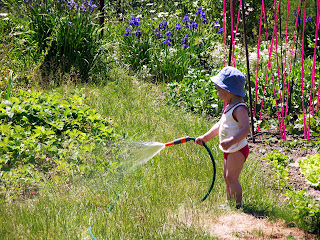Three things came
together this week and as three is my lucky number that can only be a good
thing.
Firstly, trudging
up the muddy, snowy lawn I made a mental list of all the jobs that need doing
in the garden. More chores? No, it wasn’t a feeling of burden, more a hopeful
feeling; looking forward to Spring sunshine and new things growing.
It’s the same in
gardens all around the world and my second thought was how important gardens
are to the cycle of living …. and dying. Many health care professionals and
anyone working in the caring sector will already know how important gardens are
to a patient’s wellbeing and even recovery. Gardens in hospitals, care homes
and hospices have a key role to play in not only how the patient feels but also
the experience of family, friends and visitors. The gardens I’ve come across in
these places are beautifully tended, often by volunteers, and well loved by
children, adults, staff and visitors. They are not just places of peace and
tranquillity but they signal that seasons come and go, plants die back in
winter but there will be flowers again in Spring and Summer. They deeply
connect with our sense of time passing but also our sense of hope and looking
to the future. They are also places of fun and adventure, especially for
children and siblings, they provide light relief from anything and everything
to do with everyday life … and of course, death.
And so to the
third thing that made a lot of sense; the brilliant programme on Radio 4 by
poet and author, Michael Rosen, exploring the language we use to discuss death.
Just as the 2011 “Rev” Christmas special should be compulsory viewing for
anyone contemplating becoming a vicar (see last month’s blog) so this episode
of “Word of Mouth” should be on the syllabus for anyone planning to go into
healthcare. Particularly insightful are Michael’s own observations about losing
his son, who died suddenly from meningitis. The contributions from teachers and
hospice workers also paint a picture of a scene very familiar in schools and hospices
but one which shouldn’t be underestimated in terms of its power in allowing a
person to find words for their feelings. Talking one to one with a child is
important but often the real talking comes when you get a group of children,
around a table, glue and paper and crayons everywhere and they are thoroughly
and happily engaged in something that isn’t painful or incomprehensible. The
power of that simple activity to free up the mind and allow a child to chat is
a wonderful thing. Play specialists and trained counsellors already know that
sitting side by side with a child, cutting out or colouring in, can result in
some really positive conversations as part of the healing process. It’s funny
how the simplest things can often have the most impact on our wellbeing, bit
like waiting for the snowdrops to come up.
More listening and
learning
Guest Blogger
Lynne Wilson
Guest Blogger
Lynne Wilson

No comments:
Post a Comment
Note: only a member of this blog may post a comment.